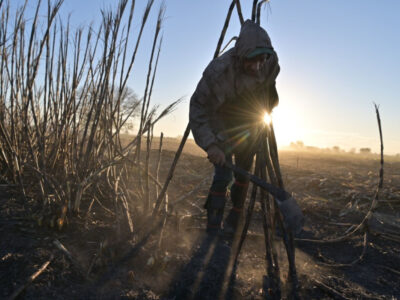
President Obama called climate change the greatest threat to our children, future generations and our planet. Among the many actions he took to protect the environment and our planet is the Clean Power Plan that requires states to reduce carbon pollution from power plants. He also set higher fuel economy standards for passenger vehicles and trucks, and energy efficiency standards for appliances and equipment. He acted to reduce methane emissions and invested over $90 billion in clean energy. He was critical to the success of the 2015 Paris Climate Agreement, which got over 190 countries to agree to reduce their greenhouse gas emissions.
President Donald J. Trump has called climate change a “hoax,” but also said he would remain open-minded about it. Environmentalists are concerned that the Republican-controlled Congress and Trump’s administration, many members of whom have ties to the fossil fuel industry, may stop or reverse the progress the Obama administration has made on climate change.
People are asking what they can do to keep climate progress moving forward. I reached out to Earth Institute climate experts and representatives from well-regarded organizations for ideas. Here’s their advice.
Earth Institute
James Hansen, director of the Program on Climate Science, Awareness and Solutions:
“By far the most effective action people can take regarding climate change is to join CitizensClimateLobby.org. It is a nonpartisan, rapidly growing organization dedicated to using the democratic process to achieve the policies needed to stabilize climate. They promote one specific policy: achieving an honest price on fossil fuels, a price that includes their costs to society (air and water pollution and climate change), by means of an across-the-board carbon fee collected from fossil fuel companies at the source (e.g. domestic mines and ports-of-entry), with the funds distributed equally to all citizens.
“This is the fastest way to decarbonization of the energy system, and economic studies show that it spurs the economy, increases the gross national product and creates millions of new jobs. Citizens Climate Lobby volunteers write letters to the editor, op-eds, and visit Congress-people to advocate this policy. Citizens Climate Lobby is growing rapidly in the U.S. and Canada, and now there are chapters in Europe, Australia and other countries. It is largely a volunteer organization based on the core values of our democracy.”
Michael Gerrard, director of the Sabin Center for Climate Change Law, said in an earlier interview:
“There is a lot of political action that can be taken at the state and local level. In some states, pressure can still be exerted on Republican members of the Senate so that there isn’t a majority vote in favor of certain anti-environmental actions. We need to support Democratic candidates, but we also need to give Republican senators a very hard time. Some of the races were close, so we need to make it clear to them that anti-climate votes will not be appreciated.”
Gerrard also called attention to citizen suits. “Many of the [environmental] regulations are still on the books, and the statutes provide for citizen suits to enforce them. This means that if the Environmental Protection Agency is not carrying out the statute or if an emitter is violating the statute, a citizen can go to federal court and seek an order that compels compliance.”

Ben Orlove, co-director of the Center for Research on Environmental Decisions:
“Individuals should join local organizations, ones that can join others in a coalition. The idea for all of these is local and community-based, so that my efforts join with those of others, and we support each other. … I would encourage people to focus on an issue that matters to them individually: promoting alternative/blocking carbon-intensive energy; environmental justice (e.g. toxics, air quality); even open space/green roofs. Be attentive to a group that you feel supports you and where you feel your energy/effort supports others.”
Scott Barrett, the first Lenfest-Earth Institute Professor of Natural Resource Economics:
“Civil protest is important, as are actions by states and cities. Work towards the next congressional election and the next presidential election.”
Steve Cohen, executive director of the Earth Institute:
“Focus on community organizing, local, city and state politics—what the president meant when he said, ‘Get a clipboard’… and remember what Tip O’Neil said—‘All politics is local.’”
Jamie Henn, director of strategy and communications:
“The best thing that people can do is to start organizing locally. Join up with the local chapter of a national organization, like 350.org, or start your own group. That can be as simple as a gang of friends who want to take creative action together or as elaborate as setting up a new NGO.
“There’s lots of important work to be done at the local level. At 350.org, we’re focused on replacing the fossil fuel industry with a clean energy economy that works for all.

That means that we need to be stopping new fossil fuel infrastructure that would lock us into decades of carbon emissions and advocating for smart policies and programs that help expand the clean energy economy in a way that benefits local communities. Individuals can get involved by finding ways to fight fossil fuel projects in their area, from lobbying politicians to direct action, or figuring out what clean energy policies in their area need support.
“Local groups can also engage in national action. Plans are already coming together for a big People’s Climate Mobilization in Washington, D.C., this April 29 to push back on Trump’s anti-climate agenda and call for a clean energy revolution. Figuring out how to bring as many people there as possible is a great way to not only support the national effort, but also build up a local group.

“Finally, fossil fuel divestment remains more important than ever. The shift to a clean energy economy is irreversible, but we need to do everything we can to keep up momentum. That means getting institutions to move their money out of fossil fuels and into renewables. There are great campaigns across the country, including in New York City and State, to get our governments to do the same thing.”
Hannah Blatt, communications coordinator:
“Call your senators. Increasingly it’s phone calls into congressional offices that are getting noticed and have the greatest impact. LCV is running online ads and engaging our mobile subscribers to drive more calls into Senate offices than ever. We’re currently engaging in mobile and online campaigns around blocking Trump’s nominees, with a particular focus on former ExxonMobile CEO Rex Tillerson for secretary of state, climate denier Jeff Sessions for attorney general, and fossil fuel industry ally Scott Pruitt for EPA administrator. To be connected to your senator to tell them to vote ‘no’ on Scott Pruitt for EPA chief, text ’Pruitt‘ to 877-877.
“After cabinet appointees are in place, we are urging people to call on their elected officials at the federal level and in the Trump administration to protect our environment and defend our bedrock environmental laws. Our government should be putting forward solutions to protect our air, water and public lands while tackling climate change head on instead of working to dismantle the progress we have made. … At the state level, we have state leagues across the country who continue to work hard to make great strides in protecting our environment and reducing our carbon pollution while growing our clean energy economy, which will create jobs and save consumers money.”
The League of Conservation Voters has an online vote tracker to help people monitor what bills are under consideration and how each representative is voting.
Adam, Beitman, deputy national press secretary:
“Environmental advocates should organize at the state and local level. Help ensure the retirement of dirty coal-fired power plants, get your towns and cities to commit to 100 percent clean energy by 2030, and stop new fossil fuel infrastructure by joining together to make your voices heard.

“Also, contact your elected representatives in the Senate and House of Representatives to make sure that they will vote based on climate action and our need to transition to an economy powered by clean energy.”
Climate Science Legal Defense Fund
Lauren Kurtz, executive director:
“Donating to support organizations that are working on climate change is absolutely critical. Government funding regarding climate change is sure to be reduced or even eliminated, and other sources of funding are being spread ever thinner in response to the growing set of challenges—while the need to combat climate change is only increasing.
“Everyone needs to be paying attention to what happens under the new administration—and contacting his or her representatives accordingly (preferably by calling).
“We all also need to support good journalism. Now more than ever, we need journalists to help serve as watchdogs and to help educate against misinformation. Paying for subscriptions to local, national and international news sources may not be a tax-deductible donation, but it is truly an investment in democracy.

“It’s also important to make personal choices that reduce your carbon footprint. (The EPA’s list of actions you can take is here.) The collective impact of individuals’ conservation efforts should not be understated.”
The Regeneration Project, Interfaith Power & Light
Rev. Canon Sally G. Bingham, founder:
“There is no one or ‘most effective action’ people can take. There is a multitude of things and all of them need to happen. Call legislators and try to defeat the cabinet nominees who are well known climate deniers. Show up at rallies, write letters to your senators in Congress. During the first 100 hours of the new presidency, there will be vigils held all over the country—go to one and hold a candle in prayer for Creation. Organize a vigil anytime between Jan. 20 and Jan. 24 (the first 100 hours) or register here for an event. Some people can divest from fossil fuel industries.
“Another thing that people can do is work really hard to get legislators into office at the mid term election who are not climate deniers. Volunteer at an organization working on climate solutions. Send money to help organizations push back on the Trump deniers.
“What individuals can do depends on their situation, their location, their financial needs, their jobs. It is personal, but do what Obama suggested…Get involved and SHOW UP!!!”
Save



